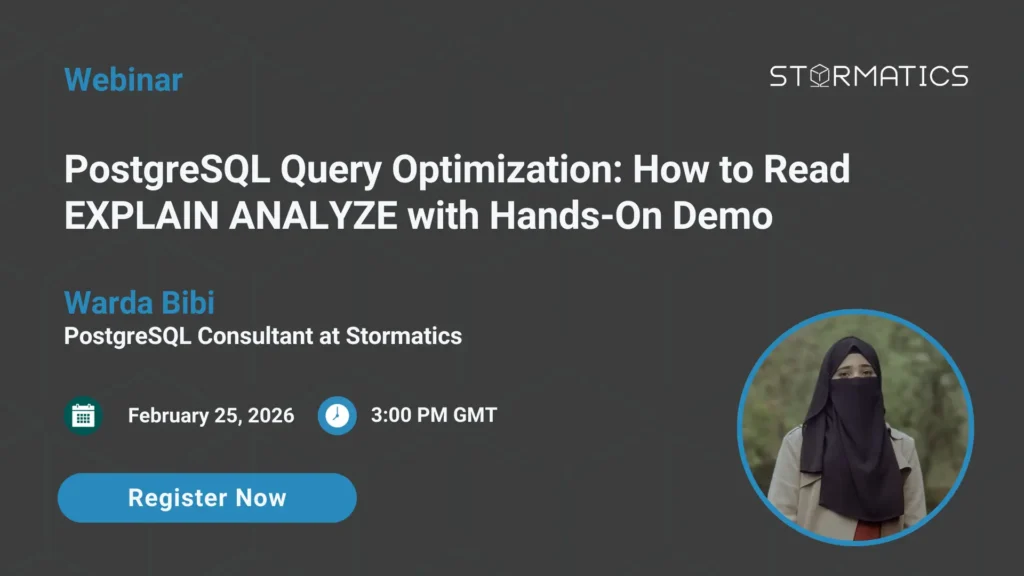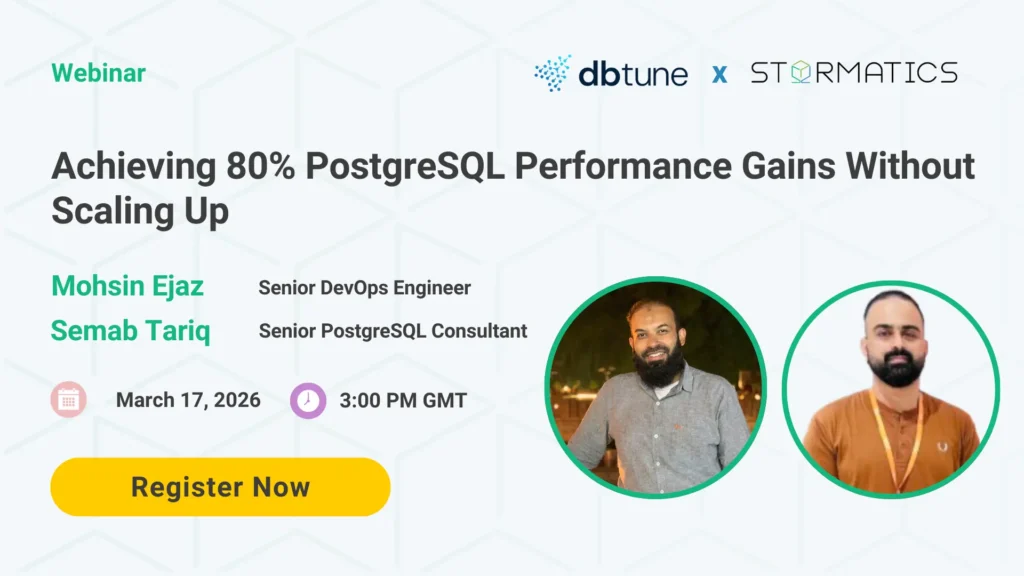Upcoming Webinars
Webinar | PostgreSQL Query Optimization: How to Read EXPLAIN ANALYZE with Hands-On Demo
We will host a hands-on session on 25 Feb 2026 at 3 PM GMT with Warda Bibi, PostgreSQL Consultant at Stormatics, where she will demonstrate how to optimize PostgreSQL queries by effectively reading and interpreting EXPLAIN ANALYZE to diagnose performance issues and design queries that scale in real-world scenarios.
Webinar | Achieving 80% PostgreSQL Performance Gains Without Scaling Up
We will host a joint webinar on 17 March 2026 at 3 PM GMT with Semab Tariq, Senior PostgreSQL Consultant at Stormatics, and Mohsin Ejaz, Senior DevOps Engineer at DBtune, where they will show how focused PostgreSQL tuning can achieve up to 80% performance gains without scaling infrastructure, using real-world customer case studies.
Past Webinars
Webinar | Advanced Indexes in PostgreSQL: Smart Indexing for Faster Queries
We hosted a hands-on session on 21 Jan 2026 at 2PM GMT with Chris Travers, Principal PostgreSQL Consultant at Stormatics, where he will demonstrate how to improve PostgreSQL performance by using advanced indexing techniques to solve real-world query and scalability challenges.
Webinar | Unlocking High-Performance PostgreSQL: Key Settings and System Strategies
We hosted a hands-on session on 17 Dec 2025 at 3PM GMT with Mughees Ahmed and Warda Bibi, where they demonstrated how to unlock better performance from their PostgreSQL databases by exploring critical configuration areas that impact speed, scalability, and reliability across production workloads.
Webinar | Achieving 99.99% PostgreSQL Uptime with Open Source Tools
On 26 November 2025, Warda Bibi and Semab Tariq delivered a hands-on webinar demonstrating how to achieve 99.99% PostgreSQL uptime using open source tools such as Trusted Postgres Architect (TPA), Patroni, pgbouncer, and Barman, sharing practical architecture patterns and real-world deployment insights.
Fireside Chat | Inside PostgreSQL 18: Performance Improvements with Bruce Momjian
On 12 November 2025, we hosted a fireside chat with Bruce Momjian, PostgreSQL co-founder and VP Postgres Evangelist at EDB. Hosted by Umair Shahid, the session highlighted the performance improvements in PostgreSQL 18 and their real-world impact for teams running Postgres in production.
Webinar | PostgreSQL Troubleshooting Made Easy with pg_gather
In this webinar, we explored how pg_gather simplifies PostgreSQL troubleshooting by collecting key diagnostic data in one go. We demonstrated how to detect table bloat and costly indexes, identify blocking sessions, analyse wait events, and apply practical tuning tips to keep PostgreSQL databases running at peak performance.
Webinar | Disaster Recovery in PostgreSQL: What Every Oracle DBA Needs to Know
In this webinar on Disaster Recovery in PostgreSQL: What Every Oracle DBA Needs to Know, see how PostgreSQL handles DR vs. HA, map key concepts like RPO, RTO, and PITR to Oracle tools, and pick up practical backup and testing tips, plus real-world lessons to keep your data safe.
Webinar | Building a Robust Disaster Recovery Strategy with PostgreSQL
In this Webinar, Semab Tariq and Warda Bibi, PostgreSQL Consultants at Stormatics, shared their expertise on building robust disaster recovery strategies for PostgreSQL production environments.
Fireside Chat | What Concerns About Databases Keep Tech Leaders Up At Night?
In this fireside chat, Iqbal Khan, President & CTO at Alachisoft, and Umair Shahid, Founder at Stormatics, had a candid conversation on how tech leaders manage the pressures of scaling database environments while balancing uptime, SLAs, and cost efficiency.
Webinar | Configuring High Availability for Mission Critical Applications in Postgres with Pgpool and pg_cirrus
In this session, Semab Tariq, PostgreSQL Consultant at Stormatics, and Muhammad Usama, Principal Engineer at Microsoft, explained how to deploy a production-grade cluster using Pgpool and pg_cirrus.
Webinar | Designing Highly Available Postgres for Continuous Operations
Learn how to design resilient, production-grade Postgres clusters that stay online, no matter what, with Boriss Mejías, PostgreSQL Solutions Architect at EDB, on 16 July 2025 at 3 PM GMT.
Webinar | High Availability in PostgreSQL for Oracle DBAs
In this joint session with Dbvisit, Umair Shahid did a deep dive into how PostgreSQL handles high availability (HA) with a lens specifically tailored for Oracle DBAs.
Fireside Chat | Evaluating Workloads: Is Postgres the Right Fit?
This fireside chat with Marc Linster, former CTO at EDB, and Umair Shahid, Founder of Stormatics, explored real-world workloads where Postgres excels and when other options might be a better fit.
Webinar | Building a Resilient HA Postgres Cluster with Patroni, pgBackRest & LUKS
Semab Tariq, PostgreSQL Consultant at Stormatics, gave a detailed session on how to build a production-ready Postgres cluster using Patroni for HA, pgBackRest for backups, and LUKS for encryption.
Webinar | Improving Postgres Performance with Partitioning
In this session, Umair Shahid talked about Postgres partitioning, explored different types, when to use them, and how they impact query performance, storage management, and overall database efficiency.
Webinar | Boost Postgres Performance & Reduce Operational Costs
Semab Tariq covered practical strategies to fine-tune Postgres performance, optimize queries, and lower cloud expenses in this session. Perfect for developers, DBAs, and tech leads looking to maximize efficiency
Webinar | Optimizing Postgres Cloud Strategy: Capacity Planning and Selecting the Right Instance Size
Umair Shahid, on 26 February 2025, gave a detailed session covering capacity planning, instance sizing, cost management, and solutions to common pitfalls in Postgres cloud environments.
Webinar | PostgreSQL Deployment for Oracle DBAs
If you are an Oracle DBA curious about PostgreSQL or just starting your deployment journey and facing challenges, watch this session by Dbvisit with Umair Shahid as the keynote speaker.
Webinar: High Availability in Postgres: Your Guide to 5 Nines and Zero Worries
Semab Tariq imparted a comprehensive session on January 22, 2025 that was all about achieving 99.999% uptime. Check out the practical HA strategies and real-time examples for maintaining continuous service and minimizing disruptions.
Webinar: Optimizing PostgreSQL for Performance, Availability, and Scalability
Discover insights from the December 18, 2024 webinar, where experts from Stormatics and Timescale shared proven strategies to tackle PostgreSQL challenges in performance, availability, and scalability.
Webinar: Achieving 99.99% Availability for PostgreSQL
To ensure uninterrupted access to critical data, organizations must adopt high availability and disaster recovery strategies tailored to their infrastructure. Umair Shahid led this session and shared everything you need to know to maintain maximum uptime.
Webinar: Minimizing Downtime with Rolling Upgrades in PostgreSQL
Rolling upgrade is a powerful technique that allows continuous database availability, even during upgrades. To learn how you can leverage this feature, Semab Tariq shared all the details in this session on “Minimizing Downtime with Rolling Upgrades in PostgreSQL”.
Webinar: From Oracle to Postgres Understanding Core Differences for a Successful Transition
Umair Shahid, on November 6, 2024, at 3 PM GMT, gave a session in which he explored the structural differences between Oracle and PostgreSQL and how to manage these differences for optimal performance.
Webinar: Deploying High Availability PostgreSQL Clusters with pg_cirrus: Simplified 3-Node Setup
Learn how to ensure minimal downtime, scale your operations effectively, and get hands-on experience with a real-world HA 3-node PostgreSQL cluster setup using pg_cirrus in this session by Semab Tariq.
Webinar: How to Minimize Data Replication Lag in PostgreSQL for Distributed Clusters
Umair Shahid talked about the key factors contributing to replication lag across distributed clusters, best practices for optimizing performance in multi-node environments, and practical strategies for reducing latency to ensure faster data synchronization in this session.
Webinar: Achieving Extreme High Availability in PostgreSQL Using Multi Master Architecture
Semab Tariq and Hari Kiran offered a detailed understanding of the Multi-Master setup and talked about the differences and similarities between Multi-Master and Single-Master setups.
Webinar: PostgreSQL 101 for Oracle Database Administrators
Learn how to approach PostgreSQL as an Oracle Database Administrator with Umair’s keynote on our partner Dbvisit’s webinar.
Webinar: Boosting PostgreSQL Performance: Tools and Techniques for Optimization
Semab Tariq shared effective and practical ways to enhance your PostgreSQL performance without breaking the bank in this live webinar.
Webinar: Backup Strategies and Disaster Recovery: Best Practices for PostgreSQL Using Barman
Semab Tariq, our PostgreSQL Consultant, explored why backups are essential, the different types of backups, and how to effectively use Barman to manage your PostgreSQL backups in this session.
Webinar: Reducing Cloud Costs by Optimizing PostgreSQL
Umair Shahid shared insights about effective cost-saving techniques and performance optimization routes one should take for their PostgreSQL instance in this session.
Webinar: Securing Personally Identifiable Information: Best Practices for FinTech & FinServ with PostgreSQL
In this webinar, Umair Shahid shared insights and practical advice on how to ensure your PostgreSQL database meets the highest security standards & complies with regulations.
Webinar: Explain Plans and Query Optimization in PostgreSQL
Semab Tariq conducted an extensive session to help you understand the execution plan of your queries and how to pinpoint performance bottlenecks of your database.
Webinar: pgvector – How to transform your search capabilities with AI
Semab Tariq delivers an information-packed session on “pgvector: How to transform your search capabilities with AI” and explains how to maximize the performance of your queries.
Webinar: Understanding NUMA policies and their impact on PostgreSQL performance
Chris Travers uncovers the complexities of NUMA (Non-Uniform Memory Access) policies and their impact on PostgreSQL database performance in this session.
Fireside Chat: Oracle to PostgreSQL Migration
Learn why PostgreSQL is the go-to alternative for mission-critical infrastructures in this fireside chat with industry veterans Umair Shahid and Jan Karremans.
Webinar: JSON performance – PostgreSQL vs MongoDB
Umair Shahid (Founder, Stormatics) explores performance benchmarks in handling JSON data between PostgreSQL and MongoDB. Find out which database reigns supreme.




